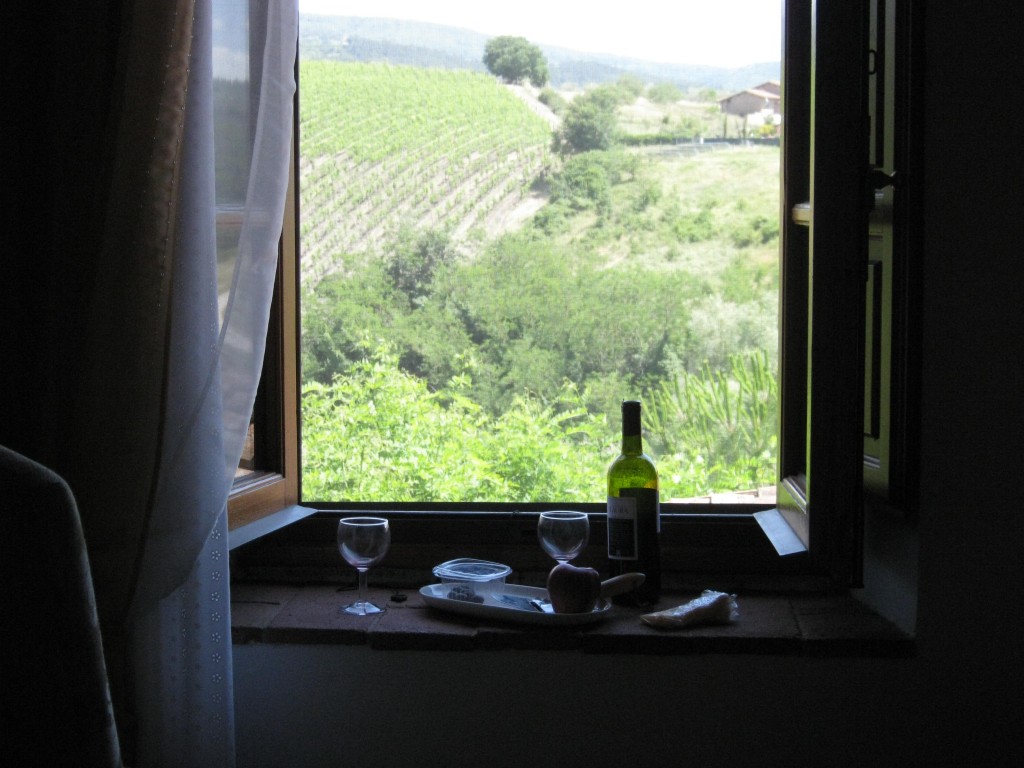
Ombreglio di Brancoli
by Suzanne Parker
So I have traveled to a place where I can’t speak the language though it is not an unusual language—Italian—but it is not my language and so feels like darkness in a hotel room. I am in a house on a high hillside, part of the foothills of the Appenine Mountains. It is very beautiful and the bees like a fleet of tiny genies are busy above the cracked surface of the meager lawn so there is a constant, shifting hum and an occasional bee will detour into the house and set up a hive. I have a study on the second floor with a view of two hills riding up to the left and right and I am wedged between them like a secret. Closer to home are the bright orange flowers of a persimmon tree so vivid with flame they demand painting—a talent I want but lack. And there is the smell—everywhere and flowing like a river through the open window—of honeysuckle, making all a kind of sweetness and even the spiked artichoke plant growing untended in the barren yard next door seems bathed in nectar, and if we picked and wallowed the overshot chokes in water, they would sigh and open in the night. And the food is the strong flavor of eggplant, eaten from the dish we baked it in last night, each slice dragged through flour and cast into good olive oil to fry then returned to the dish and layered with the fresh mozzarella that sweated a white water on the wood chopping block. And the coffee from the press—so strong I first fill half of the cup with hot milk so the coffee swells into it. All this is a morning and fills the time—eating, sipping, sitting on the terrace before the view, and then finally making it upstairs to the study and more view and sitting at the desk until the back is hurting and it is time to go downstairs and eat another mouthful of the eggplant and pour out a glass of mineral water and it is time for touching and distraction but mustn’t so back up to work and the worry that there is no use to this, no good in it, and why not simply sit and listen to the swallows who are so industrious in their looping and clearly have more already accomplished than I do, particularly one who has taken to sitting on the wire outside the window and expelling a startling array of squeaks and gurgles at such a rapid pace it’s as if there’s been an enemy landing— my presence at the window—and he’s in charge of the Morse Code, rapidly and expertly fired off and then he finishes with something impossible and operatic and pauses, head titled aloft, then busies his beak in his hind feathers and begins cleaning. Even the lizard, busily baking against the stone wall and heating his core for nightfall, is engaged. But, no, this is not that kind of bitterness, not with the air suggesting sex, not with an afternoon like a narcotic, and after the inner battling and the fingers that need cracking from lack of use, there is the realization, truly, in the bones and flesh, the understanding of why all the shops close for lunch, why all the world disappears behind shut doors and does not work nor sell things nor attempt to move on in life but instead pulls the shutters over and does what is meant to be done from 1-4pm. And it is not worry the Italian feels, leaving the house to re-open his business, of having lost a few possible Euro, it is the fact of his full stomach and the satisfied hour comparing Pavarotti singing the act II aria in Don Sebastiano at Milano’s opera to the small performance he gave in Modena to mark the anniversary of his birth town, and, though a bootleg recording, he is sure the Modena’s is the better. It is clear in the feeling in the lower registers and in that penultimate note, the way it lingers, without effort, just there, as if the listener is invited to reach out and pluck it from the air, heavy like a plum ready for his lips. What the man knows without being told or having to learn, as he raises his store’s shutters and tells the few people waiting it’ll be a while longer, is that this is the purpose of time in Italy; that it is not to be spent but held in the mouth and eaten.
Suzanne Parker is a winner of the Kinereth Gensler Book Award from Alice James Books. Her poetry collection, Viral, is a finalist for the Lambda Literary Award and was included on the American Library Association’s Rainbow List of Recommended Books of 2013. Her poetry has appeared in “Barrow Street,” “Cimarron Review,” “Hunger Mountain,” “Drunken Boat,” and other journals. She is a winner of the Alice M. Sellars Award from the Academy of American Poets and was a Poetry Fellow at the Prague Summer Seminars. Suzanne’s creative non-fiction is published in the anthology “Something to Declare.” Suzanne is the managing editor at “MEAD: A Magazine of Literature and Libations.”
Photo courtesy of the author.

Comments are closed.